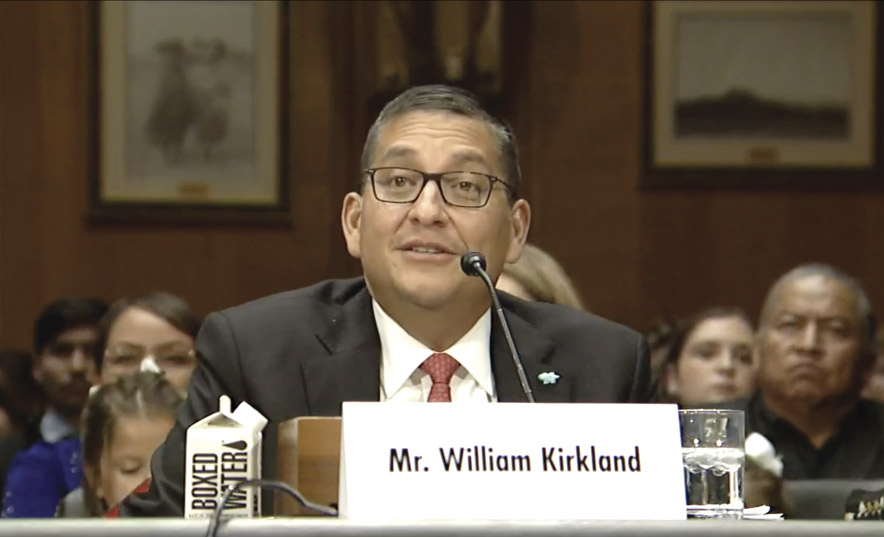
Trump’s Diné nominee for assistant secretary for Indian Affairs says he’ll lead with tribal voices

Courtesy | U.S. Senate Committee on Indian Affairs
William “Billy” Kirkland, Diné, a nominee for assistant secretary of Indian Affairs, testifies before the U.S. Senate Committee on Indian Affairs in Washington, D.C., on July 17, 2025. Kirkland pledged to lead with tribal voices and prioritize federal trust responsibilities if confirmed.
TÓNANEESDIZÍ
William “Billy” Kirkland appeared before the U.S. Senate Committee on Indian Affairs Thursday as the first Diné nominee for assistant secretary for Indian Affairs under President Donald Trump, pledging to spend his first 90 days listening before leading.
Kirkland, who was raised across military bases around the world, told the committee he would prioritize tribal consultation and uphold the federal trust responsibility if confirmed. In a testimony shaped by personal loss, family pride, and political loyalty, he laid out a vision of leadership grounded in both conservative values and cultural identity.
“I believe there is a way to bring meaningful opportunities to Indian Country while still honoring and preserving our Native heritage and traditional ways,” said Kirkland, who is Bįįh Bitoodnii. “If confirmed, I intend to spend my first 90 days listening to tribal leaders.”
He shared memories of growing up in LeChee, where he spent summers chasing sheep and hauling water for his grandmother, Susie, who lived without electricity. He spoke of enduring infrastructure failures, addiction, and the economic fallout from the closure of the Navajo Generating Station.
“My family has also experienced the darker realities of reservation life – alcoholism, drug abuse, depression, and lack of opportunity,” he said. “I’ve seen firsthand the lack of economic opportunity in Indian Country.”
Kirkland acknowledged he isn’t fluent in the Navajo language, joking to the committee, “Yáʼátʼééh, y’all. That’s Southern Navajo for hello.” He credited his mother for teaching him about the Long Walk and about Manuelito’s famous prophecy that education would be a ladder out of hardship.
Record in the Trump Administration
Kirkland previously served as a White House adviser under Trump’s first administration and said he was proud to help establish “Operation Lady Justice,” a federal initiative focused on Missing and Murdered Indigenous Women. He also cited his work on the Ashlynne Mike AMBER Alert in Indian Country Act, Opportunity Zones on tribal lands, and tribal inclusion in the CARES Act during the COVID-19 pandemic.
“These were meaningful accomplishments, but much work remains to be done,” Kirkland said.
While Trump’s record in Indian Country has drawn both praise and criticism, from support for public safety measures to backlash over sacred land protections, Kirkland signaled that his own leadership would be informed by direct consultation with tribal nations.
“As this committee knows, Indian Country is not homogenous—one size does not fit all. Each tribe is distinct, each has its own identity, history and needs,” he said. “If confirmed, my goal will be to meet those needs and further advance self-governance and self-determination. We will honor the diversity of Indian Country by ensuring our policies are responsive, respectful and rooted in partnership, and meet our trust responsibilities.”
Cautious path ahead
Kirkland said he’s sought guidance from former assistant secretaries Tara Sweeney and Larry Echohawk and promised to approach the job with humility. Quoting a Hawaiian colleague, he said, “You have to go slow to go fast.”
Whether his nomination will gain broad support from tribal leaders remains to be seen. But Kirkland has made a commitment many Native communities have long called for from federal appointees: to listen first.
U.S. Sen. Steve Daines (R-Mont.), a member of the committee, emphasized the assistant secretary’s role in upholding federal trust obligations and supporting tribal self-determination. But he also said Montana’s tribal leaders report that the Bureau of Indian Affairs is falling short – particularly on public safety. Daines described the situation on Montana reservations as a full-blown crisis, with drug cartels exploiting jurisdictional loopholes and operating with impunity.
Later in the hearing, U.S. Sen. Markwayne Mullin (R-Okla.) asked Kirkland how he feels when he’s in Indian Country.
“When in Indian Country, whether that is in Oklahoma or Montana or within the Four Sacred Mountains of the Navajo Reservation, there’s a comfort there,” Kirkland responded. “There’s a peace—more relaxed. And it’s a feeling that you want to share. There’s a pride there. And I hope to be able to honor those who’ve come before me…”
He added, “I think that President Trump and (Interior) Secretary (Doug) Burgum love and appreciate, and respect Indian Country. I think they care. And I hope to be able to honor the trust relationship that the federal government is responsible for and to advance self-determination and tribal sovereignty.”
Mullin reminded Kirkland that the role comes with a serious responsibility, no matter one’s background.
“If we’re in this position of authority, … we need to understand that and just be all in the same boat working together,” Mullin said. “Your ability to stay in the fight for Indian Country is commendable.”







 Highway 264,
Highway 264, I-40, WB @ Winslow
I-40, WB @ Winslow